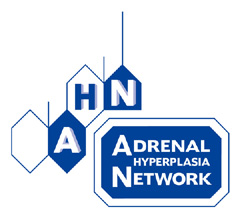Congenital adrenal hyperplasia, or CAH, is a disorder that affects the adrenal glands. The adrenal glands produce hormones, including sex hormones and cortisol and aldosterone. A person who has CAH doesn't make enough of the hormones cortisol and aldosterone, and makes too much androgen, which is a male sex hormone.
- Congenital means existing at birth (inherited).
- Adrenal means that the adrenal glands are involved. These glands are located above the kidneys. The adrenal glands produce three important hormones-cortisol, aldosterone and androgen. Each of these hormones has an important job in the body.
- Hyperplasia means an abnormal increase in the number of cells that make up an organ or tissue. This causes the organ or tissue to enlarge.
Congenital adrenal hyperplasia, then, is an inherited disorder that affects the production of certain hormones and causes the adrenal glands to become too big (hyperplastic).
CAH is usually diagnosed at birth or in early childhood. Both boys and girls can have CAH.
A group of disorders
Congenital adrenal hyperplasia is an inherited group of disorders that involves any one of the enzymes necessary to make cortisol by the adrenal glands. The disorders are named after the specific hormone that is deficient:
- 21-hydroxylase deficiency (most common)
- 11-beta-hydroxylase
- 3-beta-hydroxysteroid dehydrogenase
- 17-alpha-hydroxylase (very rare).
What are the symptoms of CAH?
Female children who have severe CAH might be born with ambiguous genitalia. This means that their genitals may look more male than female. Prior to diagnosis, as they get older, girls who have CAH may develop facial hair and a deep voice, and they may have abnormal menstrual cycles or no periods at all. Boys who have CAH often have well-developed muscles and develop masculine features early.
People who have CAH may be shorter than most average adults. They may have acne and blood pressure problems. When they get colds and sinus infections they don't get better as quickly as other people do. Women who have mild CAH often have irregular periods. They may have trouble getting pregnant. Once CAH is diagnosed, treatment can be very effective in preventing these issues.
If I have CAH, will my children get it?
If you or your partner has any form of CAH, your children might also have it. If you are pregnant and there is a history of CAH in your family, your doctor may recommend that you have an amniocentesis or chorionic villus sampling. These tests can diagnose CAH before your baby is born. If your baby has CAH, your doctor can give you medicine to treat your baby even before he or she is born. Treatment should begin as soon as possible once CAH is diagnosed.
How is CAH diagnosed?
If you are pregnant or trying to get pregnant and there is a history of CAH in the family, talk to your doctor about genetic testing.
If there are signs that your infant or child has CAH, your doctor will examine your child. Your doctor may order a blood test or urine test to confirm a diagnosis. The test results will show if the levels of cortisol, aldosterone and androgens are abnormal.
What treatment is available for CAH?
Right now, there is no cure for CAH, but there is treatment. Your doctor will prescribe a form of synthetic cortisol that will need to be taken every day. The goal of treatment is to get the hormones to a normal level. Extra cortisol may need to be taken during times of stress, such as surgery.
Managed Care Plan
It is important to have up to date information about yours or your child's health with regards to CAH. Here is a suggested managed care plan which may be helpful to carry with you or to give to carers, schools etc.
Things to remember
- Congenital adrenal hyperplasia (CAH) is an inherited group of disorders characterised by incorrect amounts of adrenal gland hormones.
- CAH is a genetic disorder, caused by an insufficiency of the particular enzymes that help convert cholesterol into the adrenal gland hormones.
- There is no cure, but the condition can be managed with medications. Most people with CAH enjoy good health and a normal lifestyle.



